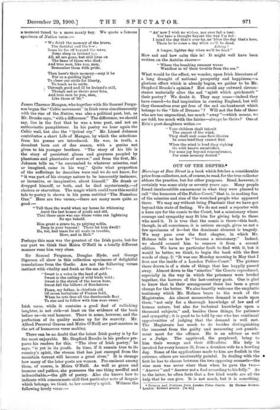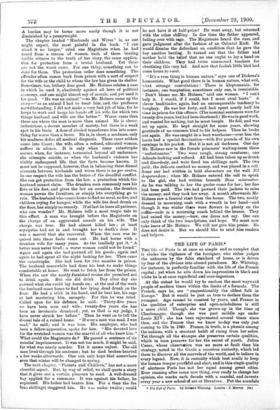OUT OF THE DEPTHS.*
Mornings at Bow Street is a book which fetches a considerable price from collectors, not, of course, to read, for the true collector abhors the practice, but for other purposes. Read, however, it certainly was some sixty or seventy years ago. Many people found inexhaustible amusement in what they were pleased to call "the humours of the Police-Court," that is, in making fun of the miseries and sins of the wretched people who appeared there. We may say without being Pharisaic that we have got beyond this state of feeling. We do not send a reporter with a keen eye for the comic to the Court, but a missionary whose courage and sympathy may fit him for giving help to those who need it. It is true that the comic is there—this book, though, in all conscience, it is serious enough, gives us not a few specimens of it—but the dominant element is tragedy. We may pass over the first chapter, in which Mr. Holmes tells us how he "became a missionary." Indeed, we should counsel him to remove it from a second edition. We have no particular fault to find with it, but it would be better, we think, to begin the book with the first words of chap. 2: "It was one Monday morning in May that I first saw the inside of a London Police-Court." The picture there drawn is of a state of things that has happily passed away. Almost down to the "nineties" the Courts reproduced, especially in the way in which the prisoners were herded together, the horrors of the last-century gaols. One is glad to know that in their arrangement there has been a great change for the better. We also heartily welcome the emphatic testimony which Mr. Holmes bears to the work of the Magistrates. An almost measureless demand is made upon them, "not only for a thorough knowledge of law and of human nature, but also for technical knowledge upon a thousand subjects," and, besides these things, for patience and sympathy; it is good to be told by one who has continual opportunities of judging that the demand is well met. The Magistrate has much to do besides distinguishing the innocent from the guilty and measuring out punish- ment meet for the offence. He is an adviser as well as a Judge. The aggrieved, the perplexed, bring to him their wrongs and their difficulties. His help is invoked for every human ill, from a drunken wife to a howling dog. Some of the applications made to him are foolish in the extreme, others are unutterably painful. In dealing with the first he has to choose betvitsfen the two opposing counsels—the wise man was never wiser than when he gave the two- " Answer " and " Answer not a fool according to his folly." As to the latter, he often feels that a few kind words are all the help that he can give. It is not much, but it is something, • Pictures and Problems from London Potted Courts. By Thomas Holmes. London : Edward Arnold. (71. ed.]
A burden may be borne more easily though it is not diminished by a pennyweight.
The chapter beaded "Husbands and Wives" is, as one might expect, the most painful in the book. "I can stand it no longer," cried one Magistrate when he had heard from a stream of women, 'each of them bearing visible witness to the truth of her story, the same applica- tion for protection from a brutal husband. Yet these are not the worst cases. For one thing, something can be done for them. The protection order does something. The offender often comes back from prison with a sort of respect for the wife or the child to whom the law has given its shelter. Sometimes, too, bribery does good. Mr. Holmes relates a case in which lie used it, absolutely against all laws of political economy, and one might almost say of morals, and yet used it for good. "He was an animal "—so Mr. Holmes sums up the story—" as an animal I had to treat him, and, the professor notwithstanding, I did not make a very bad job of him, for he keeps to work and keeps his hands off his wife, for which two things husband and wife are the better." Worse cases than these are where the man is more than animal. He is clever, industrious, a decent member of society, but there is a weak spot in his brain. A dose of alcohol transforms him into some- thing far worse than a brute. He is, in short, a madman, only his madness defies all medical diagnosis. These cases seldom come into Court; the wife, often a refined, educated woman, suffers in silence. It is only when some catastrophe occurs, when, for instance, tormented beyond all endurance, she attempts suicide, or when the husband's violence has visibly endangered life, that the facts become known. It.
must not be supposed, however, that in balancing these dismal accounts between husbands and wives there is no per contra.
In one respect the wife has the better of the dreadful conflict.
She can get protection from the law, a protection which the husband cannot claim. The drunken man commonly uses his fists or his feet, and gives the law an occasion; the drunken woman pawns the furniture, or simply lets everything go to ruin. The husband who comes home to find no meal, no fire, and children crying for hunger, while the wife lies dead drunk on the floor, has simply no remedy. If at last he loses all patience, who can wonder? Mr. Holmes tells a most tragic tale to this effect. A man was brought before the Magistrate on the charge of an aggravated assault on his wife. The charge was true. He had almost killed her ; at least erysipelas had set in and brought her to death's door. It was a marvel that she recovered. When the case was in- quired into these facts came out. He had borne with a drunken wife for many years. As the landlady put it, "A better man never lived; a worse woman could not be found." Again and again she had pawned all his goods ; again and again lie had spent all the night looking for her. Then came the catastrophe. She had been for two months in prison. The husband meanwhile had done his best to make things comfortable at home. He went to fetch her from the prison. When she saw the neatly furnished rooms she promised not to drink again. But she did drink. Day after day she pawned what she could lay hands on ; at the end of the week the husband came home to find her lying dead drunk on the floor. He had a stick in his hand, and he beat her, his rage at last mastering him, savagely. For this he was tried. Called upon for his defence, he said : `. Thirty-five years we have been man and wife ; twenty-five years she has been an inveterate drunkard ; yet, as God is my judge, I bare never struck her before." Then he went on to tell the dismal tale of a ruined home. "If ever a man was mad, I was mad," he said; and it was true. His employer, who had been a fellow-apprentice, spoke for him. "His devoted love for the wretched woman was the marvel of all who knew him." What could the Magistrate do ? He passed a sentence of six months' imprisonment. It was not too much, it might be said, for what was nearly murder. Yet it seems unjust. The old man lived through his sentence ; but he died broken-hearted • a few weeks afterwards. One can only hope that somewhere even that winter will be changed to spring.
The next chapter, "Parents and Children," has not a more cheerful aspect. But, by way of relief, we shall quote a story that it gives one a certain pleasure to read. A well-dressed boy applied for a summons. It was against his father, he explained. His father had beaten him. For a time the fee (two shillings) staggered him. He ws under twelve ; could he not have it at half-price ? He went away, but returned with the other shilling. In due time the father appeared, boiling over with rage. The Magistrate heard the case, and gave judgment after the fashion of an Oriental Kadi. He would dismiss the defendant on condition that he gave the boy another beating. It turned out that the father and mother held the belief that no one ought to lay a hand on their children. They had twice summoned teachers for chastising this very lad. And now that foolish little bird had come home to roost.
"It's a rum thing is human nature," says one of Dickens's humourists. What good there is in human nature, what evil, what strange convolutions ! There is kleptomania, for instance; one temptation, sometimes only one, is irresistible.
Don't blame me, Mr. Holmes," said one woman. "I can't help it. I would, if I could, but I must steal boots." A clever bookbinder, again, had an unconquerable tendency to burglary. He was but forty, and had spent nearly half his time in prison for this offence. (The nominal sentences were for twenty-five years, but had been shortened.) He was in good work, and wanted for nothing, but he must burgle. He fell, and was set up again. He kept straight for some years, showing gratitude of no common kind to his helpers. Then he broke out again. He was caught in a boot warehouse—over him the boots had a special fascination—with five pounds of his own earnings in his pocket. But it is not all darkness. One day Mr. Holmes saw in the female prisoners' waiting-room three unfortunates." Two were rough, strong creatures; one delicate-looking and refined. All had been taken up as drunk and disorderly, and were fined ten shillings each. The two paid; the delicate onehad no money, and was placed in a cell. Some one had written in bold characters on the wall Nil desperandum ; when Mr. Holmes entered the cell to speak to the girl, she had written beneath Deus misereatur. As he was talking to her the gaoler came for her ; her fine had been paid. The two had pawned their jackets to raise the money, and they took her away. A month afterwards Mr. Holmes saw a funeral start from the house. The two, neatly dressed in mourning, each with a wreath in her hand—and though it was winter there were flowers in plenty on the coffin—rode in a mourning coach behind the hearse. They had raised the money,—how, one dares not say. One can only think of the two inscriptions, and hope. We must now take leave of Mr. Holmes. We will not give him praise. He does not desire it. But we should like to send him readers and helpers.



































 Previous page
Previous page